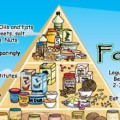
When a fetus is being carried by a woman with too much amniotic fluid, the practice used to be injecting a sweet-tasting substance into her womb. The result is that the fetus will drink in more of the fluid which then gets flushed out through the umbilical cord thus alleviating the dangers associated with this condition. Is this innovative problem-solving on the part of the medical community? Absolutely. But it’s also fascinating when you consider that even in the womb we humans are drawn toward sweet-tasting substances. This combined with the fact that the average American currently takes in an average of 70 pounds of added sugar every year might feel a little bit like a losing battle or worse yet a battle not even worth engaging in. But we have to because we’re in trouble as a nation when it comes to health. We’re growing more obese and more diabetic by the day and the top killers are all lifestyle based. Included in the mix the pendulum swing extreme position that suggests “all carbs are bad because they convert to sugar in the body and should be avoided” people. In fact, a growing number of research studies suggest that sugar might be the biggest problem as far as natural substances go and since sugar and most other types of sweeteners is vegan, our community doesn’t have any less of a problem on our hands. Here we’ll take a look at the difference between types of carbohydrate and how your body deals with them, whether or not sugar addiction is a real thing and what to do to cut back on sweet-based foods.
Simple Carbohydrates: What Would Your Liver Tell You If It Could?
Carbohydrates are one of three macronutrients (along with protein and fats) that supplies energy (calories) to the body. Three broad categories of carbohydrates are sugars (also called simple carbohydrates), starches (also called complex carbohydrates), and fiber. Except for fiber and resistant starch, carbohydrates cause more and faster blood glucose rises than the other macronutrients. Fiber and resistant starch are not digested in the small intestine, but have many positive effects. Depending on the type of carbohydrate (simple vs. complex) it is handled differently in the body. A 100-calorie potato (mainly glucose) and a 100-calorie soda (glucose plus fructose) are metabolized differently. Fructose goes straight to the liver verses glucose from sugar and starches is metabolized by every cell in the body.
Some research suggests that when fructose hits the liver in sufficient quantity and with sufficient speed, the liver will convert much of it to fat which they believe is not only contributing to an increase in a person’s waistline but also eventually induces a condition known as insulin resistance. This is the beginning stages of diabetes and there’s also a very strong link between this and heart disease. One compelling question yet to be answered conclusively is whether being overweight is the risk factor or if too much simple sugar is the greater culprit but what we do know is that sugar oftentimes replaces foods that are nutrient dense while at the same adding a lot of calories and contributing greatly to excess weight gain.

Is Sugar Addictive?
You can probably answer this question yourself either from personal experience with how it makes you feel but there’s also enough scientific evidence to suggest two aspects of a physiological addiction to sugar. First of all there are the same kinds of changes in brain dopamine after ingesting a good amount of simple carbohydrate as there is with illegal drug use. Secondly, many people tend to crave carbohydrates during times of emotional and physical stress because ingesting carbohydrates triggers the release of serotonin which induces sleepiness. Sugar can also have a kind of analgesic effect in the body (temporarily) which brings about the sensation of less pain. Physical symptoms aside, another factor worth looking at is the symptom of dependence; that an individual would still choose to do something that they know is harmful to their well-being and overall health. Despite not being able to sit comfortably or even walk beyond a slow jaunt they will still choose the high sugar content foods.
Susan Kano, author of Making Peace With Food suggests that while some people are naturally more sensitive to the ill physical effects of sugar, the greater factor might be whether or not your weight is within a healthy range and has stayed that way for at least a few years. She has found that being underweight cause’s insatiability and research findings would back her up on this one. Some studies have found that being underweight, or having an unstable weight causes“extended taste responsiveness” to sugar. In other words, if a person at a healthy weight begins to drink a can of soda (this is assuming that the person in question is not addicted to caffeine) then it wouldn’t take long for that person to lose their taste for it as opposed to the unstable or underweight person who would continue to enjoy it and even want more. It’s one of the body’s mechanisms for encouraging increased consumption and weight gain or with chronic dieters the body might simply be a bit confused! And then of course there’s the guilt, shame and annoyance that follows as well and maybe even a sick-feeling stomach and grouchy disposition.
So how would you know if you were getting too much added sugar? Well, there are no real guidelines out there as to how much is “too much” because the research is inconclusive but it’s safe to say that we’re getting way too much. The American Heart Association recommends that women consume no more than 6 teaspoons per day and men 9 teaspoons. To put this into context, a can of soda has about 8 tsp. of added sugar but you also need to know the conversion of grams to teaspoons because nutrition labels oftentimes give amounts in grams. One teaspoon of sugar is about 4 grams. As I mentioned earlier, the average American is taking in roughly 70 pounds per year. That comes to around 94 grams (or 24 teaspoons)/day.
How to Break Free From Excessive Sugar Intake
- Be ready for withdraw symptoms: If you’re currently eating and/or drinking large amounts of added sugar then expect it not to be an easy habit to break. Symptoms of withdraw could include fatigue, depression, insatiability and uncontrollable urges for sweets. Reducing moderate amounts of sugar might not be as physically difficult but you’ll still be dealing with the discomforts associated with breaking a lifestyle habit. The physical effects should dissipate after 4 to 7 days but breaking a habit can take around 3 weeks.
- Get rid of all sugar, non-nutritive sweeteners and sugary foods in your home: Once you have broken the habit then you should be able to bring some back in because you’ll be the one in control at that point.
- Strive to be an excellent label reader: Pay attention to the Sugar content, not the total carbohydrate. Added sugar is the problem not carbohydrates as a whole. Added sugar is in a lot of foods because it acts as a preservative or is used to replace fat in low or fat-free products.
- Don’t allow yourself to get really hungry before eating and have a plan ahead of time for your snacks and meals.
- Increase your fresh fruit and vegetable Intake: This hasn’t been scientifically proven but I can tell you from working with clients that the more of these they add to their daily diet the less they crave sugary, fatty and processed foods. Aim for 10-15 servings per day.
- Get Physical: Not only will it keep your spirits up but it will prevent sleepiness as well. Just don’t use the extra exercise to justify a few helpings of empty calories!
- Don’t Reward Yourself or Your Children’s Behavior With Sweets
- Work to Achieve a Healthy Weight and Then Stick To It.
by Melissa Sanborn of Nutritional Brands, PureVegan
Resources
- Gelfand, Jonathan L, MD. The Truth About Sugar. http://www.webmd.com/food-recipes/features/health-effects-of-sugar?page=4
- Taubes, Gary. Is Sugar Toxic?
- Healthy Alternatives to Sugar. http://www.naturalnews.com/022692
- Kano, Susan. Making Peace with Food. Harper and Rowe, 1989






1 Comment
Chia (324 comments)
November 14, 2012 at 10:34 amSugar is highly addictive, and too much of it alters and wrecks one’s mood and blood sugar level. I can always feel the difference after I have one too many sweets. Dilemma!